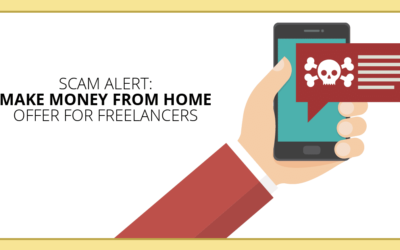
Breathe into a paper bag if you need to. OK? Here we go.
First, let me just say that in-person networking is a powerful way to meet people who can connect you to new writing clients. Meeting live humans cannot be beat for this (take that, social media!). Even if you aren’t a social butterfly, I highly recommend giving in-person networking a serious try.
I attended one conference-and-networking event last month and met two magazine editors, one of whom pays $1 a word. My experience is far more prospective clients advertising online are looking for writers to work for slave wages, while people who network in person seem to usually offer a fair wage. To sum up: It’s really worth learning how to do in-person networking.
I’ll tell you a little secret about networking — once you get the hang of it, it’s actually fun. No, I’m not joking. You get to leave your cave, have a drink, laugh, and make new friends. It’s a chance to be open to the possibility of making a new connection that could change your whole writing career. And we should all be open to that.
How can you get started in networking, overcome your fears, and make it pay off? Here are my tips:
- Start slow. Don’t have any goals for your first event except to go, smile at people, walk around, and listen. Don’t feel any pressure to accomplish anything. Just tune your radar in and observe what goes on. Now, that wasn’t too hard, was it?
- Try different events. I recently took my husband to a Linked:Seattle meetup with more than 200 people. He hated it. “Too overwhelming, too much noise, too crowded, too snobby, too intimidating,” he reported. He later tried a local networking group where just a dozen or two people meet for breakfast on Fridays. He loves it, has made great friends and connections, and goes every week. There are breakfast groups, walk-and-talks, groups that meet in art galleries. There are networking groups that welcome all comers, and the kind where you pay a membership fee and they only admit one person per industry. Keep looking until you find the place where you feel comfortable and get quality leads.
- Grow your network. It’s called networking because the point is to grow your network — to increase the number of people who know about your business. I think what makes a lot of people nervous about networking is the idea of asking people for work. But good networkers don’t do that. Finding clients grows naturally from the main task of expanding your circle. It’s a lot less intimidating when you think your goal at a networking event is simply to make new friends.
- Serve others. The most successful networkers help the people in their network by referring them prospective clients. Make your main goal to get acquainted with people you meet at networking events. Rather than worrying about burnishing a pushy, salesy “elevator speech,” just ask everyone you meet what they do. They’ll be thrilled to tell you. If you know anyone who might need their product or service, let them know you’ll refer them. That’s what it’s all about.
- Know yourself. Many writers have expressed anxiety to me that they “don’t know what to say” when people ask what they do. If this is you, come up with a statement before you arrive at a networking event. You’ll only have a minute or two to convey your essence to each person, so keep it simple and concise. For instance, I usually say I’m a freelance writer and blogger for both publications and corporations, looking for markets that need ongoing writing help. Defining your ideal client in your statement is a great way to help people remember you and what you’re seeking. Practice your spiel with friends to build confidence.
- Give something away. One icebreaker at networking events is to make some sort of special offer to event attendees. It could be a discount, promotional product handout, or free hour of consulting, but whatever it is will help you stand out from the crowd. Ideally, print up fliers or special business cards to hand out that have the offer. That’ll give you something to say.
- Follow up. Meeting someone at a networking event is an opportunity to begin a relationship. Take those business cards home and send an email, connect on LinkedIn, send them an interesting article, or set a time to meet for coffee. Create a followup schedule and stay in touch. I’ve had prospects I knew a year or more before they finally gave me a gig.
Have more questions about networking? Leave a comment below and tell us about it.
Get the Make a Living Writing blog as a free email, and you won’t miss any tips for earning more from your writing.
Photo via Flickr user Matt from London









